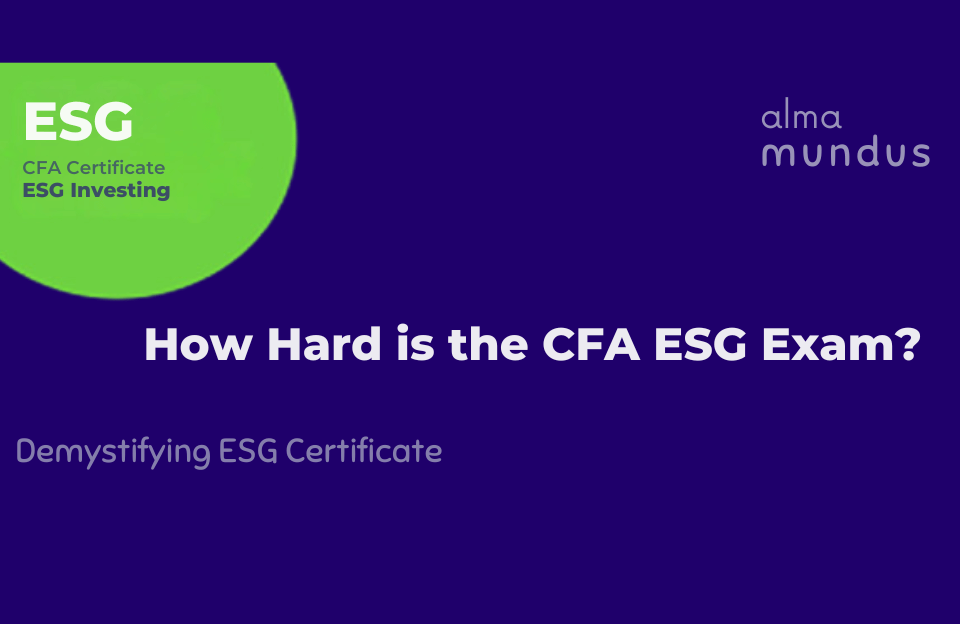Are you ready to take your expertise in finance and investments to the next level? The CFA ESG exam might just be the challenge you’re looking for. But before you dive headfirst into studying, it’s important to understand what this exam entails and how difficult it really is. In this blog post, we’ll explore the ins and outs of the CFA ESG exam, discuss its difficulty level, provide study tips from previous test-takers, and help you decide if it’s worth your time and effort. So buckle up as we embark on this exciting journey towards becoming a certified expert in environmental, social, and governance considerations!
Table of Contents
What is the CFA ESG exam?
The CFA ESG exam, also known as the Chartered Financial Analyst Environmental, Social, and Governance exam, is a specialized certification focused on sustainable and responsible investing. It aims to equip finance professionals with the knowledge and skills to analyze investments through an environmental, social, and governance lens.
This exam goes beyond traditional financial analysis by incorporating factors such as climate change risks, corporate social responsibility practices, and diversity within companies. It recognizes that investors are increasingly considering these non-financial aspects when making investment decisions.
The CFA ESG exam demands commitment from candidates who want to excel in sustainable finance. It offers an opportunity for individuals passionate about combining their financial expertise with environmental or social causes. By obtaining this certification,
finance professionals can enhance their career prospects in an evolving field that values socially conscious investing practices cfa esg mock exam.
Difficulty level of the exam
The difficulty level of the CFA ESG exam is often a topic of interest for aspiring candidates. It’s important to note that the exam is designed to assess one’s knowledge and understanding of environmental, social, and governance (ESG) principles within the context of financial analysis.
The CFA ESG exam covers a wide range of topics, including sustainability standards, ethical considerations, climate change risks, corporate social responsibility, and more. The depth and breadth of these subjects can make the exam challenging for many individuals.
To successfully pass the CFA ESG exam, candidates need to have a solid foundation in finance and investment concepts while also being well-versed in sustainable investing practices. This requires a comprehensive understanding of both traditional financial analysis techniques as well as emerging ESG frameworks.
Candidates should expect questions that test their ability to integrate ESG factors into investment decision-making processes. They may be asked to analyze case studies or evaluate real-world scenarios where sustainability considerations play a crucial role.
Preparing for this examination requires diligent studying and practice with various study materials such as textbooks, online courses, practice exams, and industry reports. It’s essential to allocate sufficient time for thorough preparation given the complexity of the subject matter.
Format and structure of the exam
The format and structure of the CFA ESG exam is designed to test your knowledge and understanding of environmental, social, and governance (ESG) factors within the context of investment decision-making. The exam consists of multiple-choice questions that are divided into two levels: Level I and Level II.
At Level I, you will be tested on foundational concepts related to ESG investing. This includes topics such as ESG integration, impact investing, sustainable finance frameworks, and regulatory considerations. The exam questions are designed to assess your ability to apply these concepts in real-world scenarios.
Level II builds upon the knowledge acquired at Level I and focuses on more advanced topics. You can expect questions that require a deeper analysis of ESG issues, including portfolio management strategies, corporate sustainability practices, stakeholder engagement approaches, and measuring impact.
In summary,the format and structure of the CFA ESG exam follow a comprehensive approach where both theoretical knowledge and practical application are assessed. By familiarizing yourself with these aspects beforehand through dedicated study efforts,strong preparation,and practice,you can increase your chances of success on this challenging assessment!
Study tips for success
1. Start Early: The CFA ESG exam is no walk in the park, so it’s important to give yourself enough time to prepare adequately. Begin your studies well in advance, allowing you to cover all the material thoroughly.
2. Create a Study Schedule: Develop a study plan that fits your lifestyle and commitments. Break down topics into manageable chunks and allocate specific times for studying each day or week.
3. Understand the Exam Format: Familiarize yourself with the structure of the exam, including question types and time limits. This will help you strategize how much time to spend on each section during practice exams.
4. Practice, Practice, Practice: Regularly test your knowledge by taking mock exams under timed conditions. This will not only help you gauge your progress but also familiarize you with the exam format and improve your time management skills.
5. Focus on Weak Areas: Identify areas where you feel less confident and dedicate extra time to mastering those topics. Utilize online resources or seek guidance from experienced professionals who can provide valuable insights.
6. Join Study Groups or Forums: Engaging with fellow candidates can be beneficial as they may offer different perspectives or share useful study materials and tips.
7. Stay Consistent: Maintain discipline throughout your preparation period by sticking to your study schedule, reviewing material regularly, and staying motivated even when faced with challenging concepts.
Remember, passing the CFA ESG exam requires hard work, dedication, and determination – but with effective study strategies in place, success is within reach!
Real-life experiences from previous test-takers
Real-life experiences from previous test-takers can provide valuable insights into the difficulty level of the CFA ESG exam. These firsthand accounts offer a glimpse into what to expect and how to prepare effectively.
One test-taker, Sarah, described the exam as challenging but manageable with sufficient preparation. She emphasized the importance of understanding key concepts related to environmental, social, and governance factors in investment decision-making. Sarah also highlighted the significance of practicing past exam questions and mock exams to develop familiarity with the format and timing constraints.
Jane recounted her experience as mentally demanding yet rewarding. She stressed the need for comprehensive revision by utilizing study materials such as textbooks, online resources, and study groups or forums to clarify doubts.
These real-life experiences highlight that success in the CFA ESG exam requires dedication, thorough preparation, effective time management strategies,and an understanding of relevant concepts within sustainable investing practices click this spoto site.
Preparing for the exam: resources and study materials
Preparing for the CFA ESG exam requires a strategic approach and access to reliable resources. To ensure success, it is crucial to have a solid study plan in place and utilize the right materials.
One key resource that can greatly aid your preparation is the official curriculum provided by CFA Institute. This comprehensive material covers all the necessary topics and provides in-depth explanations, making it an essential tool for exam readiness.
Furthermore, attending review courses or webinars conducted by industry experts can provide valuable guidance and help clarify any challenging concepts you may encounter during your studies.
Staying updated with current events related to environmental, social, and governance issues is vital as these topics are at the core of this specialized exam. Utilize reputable news sources or subscribe to newsletters focused on sustainable investing trends.
By utilizing these resources effectively and maintaining discipline throughout your preparation journey, you will be well-equipped for success in tackling the CFA ESG exam!
Conclusion: Is it worth taking the CFA ESG exam?
After considering the difficulty level, format and structure of the exam, as well as hearing from previous test-takers, one might wonder if pursuing the CFA ESG designation is truly worth it.
The answer to this question ultimately depends on your career goals and interests. If you are passionate about sustainable finance and want to make a positive impact in the investment industry, then undertaking the CFA ESG exam could be a valuable step towards achieving your objectives.
Obtaining the CFA ESG designation demonstrates your commitment to environmental, social, and governance considerations within investment decision-making. It showcases your expertise in integrating sustainability factors into financial analysis and portfolio management.
Moreover, with growing awareness around sustainable investing and increasing demand for professionals who understand ESG issues, having this specialized knowledge can set you apart from other candidates in a competitive job market.
So whether you’re an aspiring professional looking to enhance your career prospects or an experienced practitioner seeking validation of your skills in responsible investing – embarking on this journey will not only expand your knowledge base but also contribute positively towards building a more sustainable future through finance.
Take up the challenge of acquiring this esteemed designation today!


